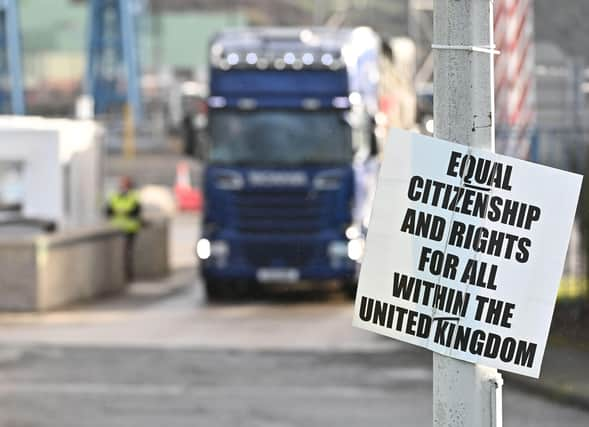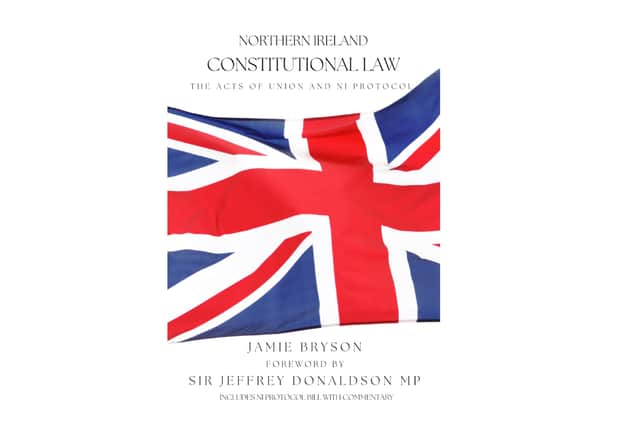Jamie Bryson: To defend the Union, our best weapon is the law


Northern Ireland presently faces its greatest constitutional threat since its inception via the NI Protocol. This is so because the effect of the Protocol is to subjugate Article VI of the Acts of Union (the common name given to the parallel Acts of the old Irish and GB Parliament which together formed the United Kingdom of Great Britain and Northern Ireland).
Put simply, in the words of the late David Trimble: The Acts of Union is the Union. Its abolition was also a key nationalist target at the time of the Belfast Agreement. In 1998 Martin McGuinness said: “We fought for and got the repeal of the Government of Ireland Act, which underpinned the Union, and insisted that other relevant legislation including the Acts of Union ... must also be altered, repealed or rendered inoperable by any new Act.”
Advertisement
Hide AdAdvertisement
Hide AdIf the Protocol has done anything ‘positive’, it is that it has politicised a new generation of unionists/loyalists and brought the Acts of Union back into public consciousness. It has also demonstrated the continued application of the Acts of Union, which remain firmly in force - contrary to what nationalists believed they had achieved in 1998, as set out above.


The increased awareness of the fundamental importance of the Acts of Union is in no small part traceable to the Allister et al pan-unionist legal challenge, spearheaded by John Larkin QC and Denise Kiley BL. It is appropriate that the case will be remembered as Allister, given it was the TUV leader who first sounded the alarm as to the threat posed by the Protocol to the Acts of Union.
The legal challenge is, in my view, the biggest constitutional case in Northern Ireland’s history, which is due to be heard by the Supreme Court in November.
The written and oral submissions by Mr Larkin and Ms Kiley in the High Court and Court of Appeal were a tour-de-force defence of Northern Ireland’s most fundamental constitutional principles.
Advertisement
Hide AdAdvertisement
Hide AdIn addition, the DUP placed the Acts of Union at the very heart of their key tests, which must be satisfied before a return to power sharing - in whole or in part - in Northern Ireland. This has been supplemented by a series of superb speeches in the House of Commons by Sir Jeffrey Donaldson MP.
It is equally important to recall several excellent contributions by the PUP’s constitutional law working group.
In recent years, a new appreciation as to the effect - and continued fundamental importance - of the Acts of Union has developed in the unionist/loyalist community. There is a thirst for knowledge, and constitutional law - which underpins our political and cultural identity - has become an area of intense interest for many.
The first book in the series is designed to harness that appetite for further learning across the unionist/loyalist community by providing an all-in-one resource for those seeking information on the Protocol, the Acts of Union, or the related legislative constitutional statutory provisions and/or treaties. This information resource is accompanied by detailed explanatory commentary on the relevant material, including the NI Protocol Bill.
Advertisement
Hide AdAdvertisement
Hide AdI am passionate about creating learning pathways and encouraging all unionists/loyalists to pursue careers, or merely a personal interest, in the law. In regards our political and cultural identity, there is little as important as the constitutional law which created and sustains the Union.
And in defending the Union, our best weapon is the law. The use of litigation in advance of our political objectives has been neglected by unionism/loyalism for decades. It is a matter of pride that this is beginning to change, with a growing number of unionists/loyalists seeking to bring legal challenges in reliance upon Human Rights and/or fundamental constitutional law provisions.
In the foreword to the book, Sir Jeffrey Donaldson MP echoes the calls for unionists/loyalists to become more engaged with the law. It is an important contribution and demonstrates that political unionism is alert to the need to place significant importance on developing capacity in this area.
It is my hope that the book will provide a useful resource not only for those wishing to learn more, but also for professional legal practitioners operating in relevant areas of constitutional law.
Advertisement
Hide AdAdvertisement
Hide Adl Jamie Bryson is a loyalist commentator and editor of UnionistVoice.com
l Northern Ireland Constitutional Law is published by Unionist Voice Publications Ltd and is available on Amazon or via Unionist Voice.